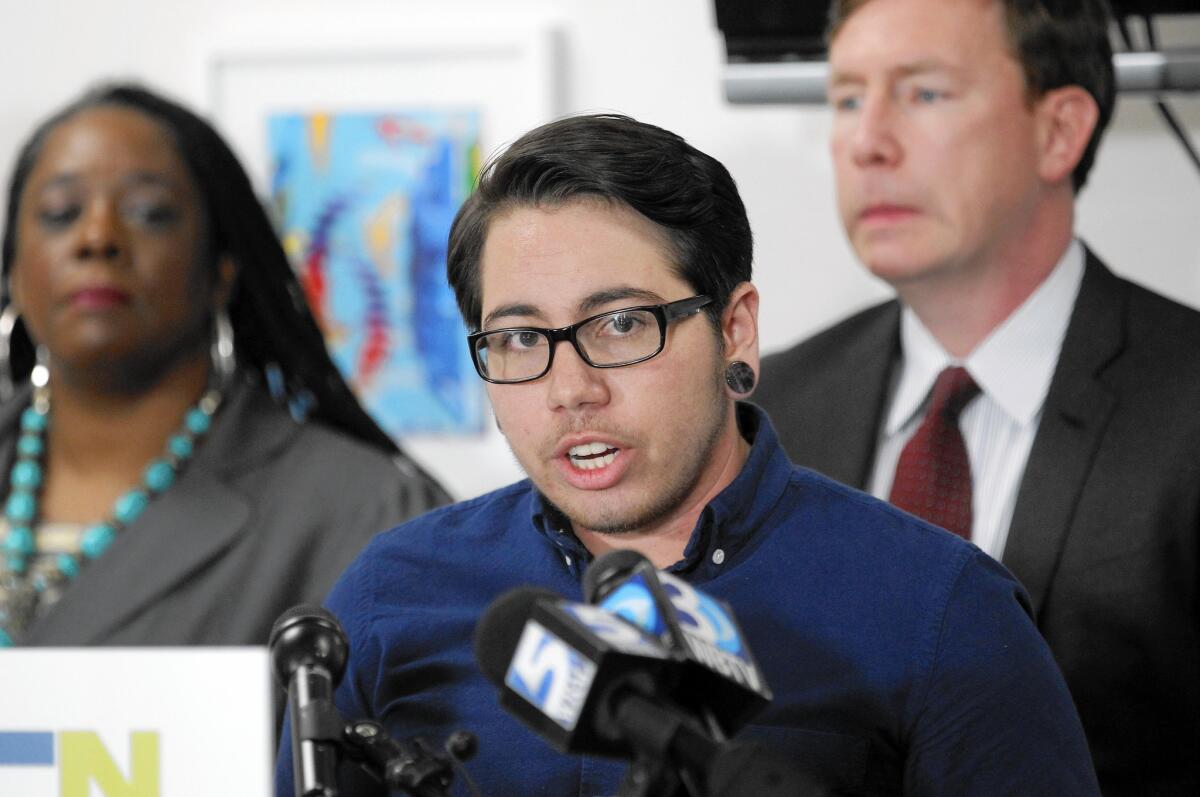Get ready for more state-level showdowns over LGBT rights

Lead plaintiff Joaquin Carcano at a news conference to announce the filing of a federal lawsuit challenging North Carolinaâs anti-gay law. Simone Bell of Lambda Law and the ACLUâs Chris Brook are behind him.
Reporting from ATLANTA â Under pressure from the entertainment industry and major corporations, Georgia Gov. Nathan Deal on Monday vetoed a âreligious libertyâ bill that would have made it legal to deny services to gay people.
His decision stands in sharp contrast to the situation in North Carolina, where Gov. Pat McCrory vowed to defend a new state law that prohibits legal protections based on sexual orientation and gender identity, even as civil rights advocates filed a lawsuit Monday to strike it down.
The two states are the latest battlegrounds in what is becoming a state-by-state fight between liberals and conservatives over who can be granted â or denied â protections related to housing, employment and even access to public bathrooms.
NEWSLETTER: Get the dayâs top headlines from Times Editor Davan Maharaj >>
The conflict has only grown since the U.S. Supreme Courtâs ruling last summer to legalize same-sex marriage, which emboldened civil rights activists to seek greater protections.
They have made headway in predominantly liberal cities, where local governments sympathetic to the cause have favored anti-discrimination laws that guarantee transgender people the right to use the bathrooms that match their gender identity and prevent employers from firing people for being gay.
At the same time, conservative legislatures have been moving to limit transgender bathroom use and expand exemptions allowing people to deny services that might conflict with their religious beliefs.
In response, national advocacy groups, celebrities and businesses have threatened boycotts to put pressure on governors and legislatures to back down from those plans.
At least for now, they have claimed victory in Georgia.
Lawmakers there passed the Free Exercise Protection Act on March 16 with the aim of ensuring that a pastor could not be forced to perform a same-sex wedding and that nonprofit faith-based organizations could legally refuse to rent or lease property for events they found objectionable.
The bill also sought to give such groups the right to fire or not hire people whose practices they opposed on religious grounds.
The legislation met sustained opposition from major players in the movie and television industries, which increasingly have been filming in Georgia because of its tax breaks and lower labor costs.
Disney and Marvel threatened to stop film production there if Deal signed the bill into law. Apple, Comcast, Dell, Time Warner, Sony Pictures and other companies urged the governor to veto it. At least 40 actors and filmmakers, including Anne Hathaway and Julianne Moore, joined the rebellion.
When Deal announced that he was vetoing the bill at a news conference Monday, he said he was not just providing a business-friendly climate for job growth in Georgia but also embracing Georgiaâs image as âa welcoming state.â
He insisted, however, he was following his own conscience and not succumbing to the outside pressure.
âTo those within the business community, some of whom â not all, by any stretch â have resorted to threats of withdrawing jobs from our state, they should know: I do not respond very well to insults or threats,â Deal said.
The Motion Picture Assn. of America, a trade organization that represents the studios, lauded the veto, releasing a statement that âwe look forward to continuing to work with the governor and the state Legislature to expand and enhance the motion picture and television industry in the state.â
In contrast, North Carolina has stood firm on its legislation.
The state law, which was passed in a special session and bans cities from passing their own anti-discrimination ordinances, came in response to the city of Charlotteâs decision to do just that. It also restricts people to the bathroom corresponding to the gender on their birth certificates.
Opponents of the Charlotte law had repeatedly suggested that transgender women were potential pedophiles, with little evidence.
âYou know, $42,000 is not going to cover the medical expenses when a pervert walks into a bathroom and my little girls are in there,â said one Republican state senator, Andrew Brock.
He was alluding to the $42,000 cost of holding a special session, according to the Salisbury Post.
The federal lawsuit filed Monday comes from a coalition of advocacy groups, including the American Civil Liberties Union, Lambda Legal and Equality NC. They are seeking an injunction against the new law on the grounds that it violates the 14th Amendment as well as Title IX.
âNorth Carolina is going to be a cautionary tale of what happens when the government decides to discriminateâ against its own people, said Lambda Legal attorney Peter Renn, one of the attorneys on the case. âLetâs be clear: You will be sued if you pass a law like this,â he said.
Payton McGarry, a 20-year-old transgender student at the University of North Carolina-Greensboro, said he decided to become a plaintiff in the lawsuit after listening to the âappallingâ way lawmakers described transgender people.
When McGarry began transitioning to a boy in high school, the bathroom suddenly became one of his biggest danger zones.
Join the conversation on Facebook >>
When he used the girlsâ restroom, he was pushed, slapped and screamed at, so he started avoiding restrooms â to the point that he developed urinary tract infections.
âIt took such a toll on my mental well-being to think, âHey, could this bathroom be the one where I finally get beaten to a pulp?ââ McGarry said in an interview with the Los Angeles Times. He said that he has not faced discrimination as a transgender man at college.
McGarry criticized lawmakersâ claims that the bill was passed for the privacy and safety of girls and women in restrooms.
âIf you want to know what kind of genitals I have, then itâs you invading my privacy,â McGarry said. âYou are trading the safety and well-being of transgender people for this perceived threat that doesnât really exist.â
In response to the lawsuit Monday, the governorâs office decried the âdistortion of the factsâ by activists and the media.
âThe governor will continue to set the record straight on a common sense resolution to local government overreach that imposed new regulations on businesses that intruded into the personal lives of our citizens,â spokesman Graham Wilson said in a statement.
Now, both sides expect a showdown in court.
Times staff writer Pearce reported from Los Angeles and special correspondent Jarvie from Atlanta. Times staff writers Daniel Miller and Libby Hill contributed to this report.
ALSO
Words of warning â not celebration â in Silicon Valley after FBI ends Apple fight
Say goodbye to eighth grade Algebra 1 and hello to the rise of Common Core math
Report finds flaws in L.A. Countyâs system for defending children accused of crimes
More to Read
Sign up for Essential California
The most important California stories and recommendations in your inbox every morning.
You may occasionally receive promotional content from the Los Angeles Times.











